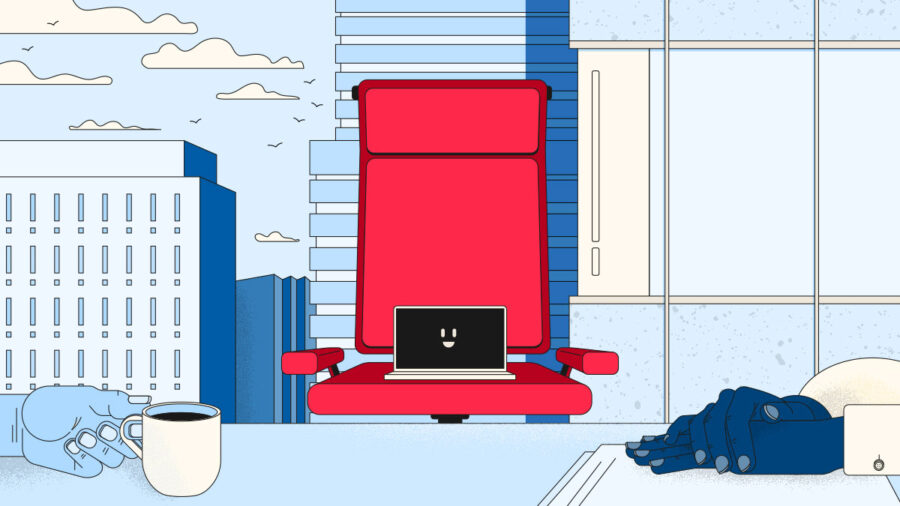
Sometimes it can feel like AI is a part of the team. Whether you favour Perplexity, Claude, Gemini or ChatGPT, you likely have a preferred co-pilot you turn to for support at work. But the next generation of AI is different. It’s no longer just answering your questions and scanning large documents: AI is now working autonomously – it’s becoming a colleague.
Across industries, digital agents are joining the workforce, taking on administrative and operational tasks once reserved for humans. For HR leaders, this presents a new challenge: ensuring AI agents are not only compliant and effective, but integrated in ways that enhance human performance.
It’s not quite science fiction: you won’t be running AI-colleague disciplinaries or adding agents to your payroll. But HR has a crucial role to play in shaping how these technologies fit into the workforce.
What are AI agents?
In simple terms, AI agents are systems that can perform tasks autonomously. They can make decisions, solve problems and carry out actions on their own. For businesses, they offer far more time-saving potential than standard generative AI platforms, which operate on a prompt-response model. Agents go one step further, automating complex or repetitive administrative tasks and freeing up human colleagues to focus on the work that really matters.
In the last quarter alone, Microsoft, Amazon and Google have all unveiled enterprise-grade agentic AI tools, making it easier than ever for companies to integrate AI agents directly into workflows. Their impact, however, will extend far beyond IT.
HR’s stake in AI
Technology in the workplace increasingly touches every department. Just a few years ago, AI was just an IT concern. Now, HR leaders like myself are writing AI workplace policies, upskilling teams and using AI to review data, spot trends and help drive efficiency.
As AI agents become capable of ever more complex work, HR’s role will expand further – into onboarding, performance management and even digital workforce planning.
It might sound counterintuitive, but AI agents, while autonomous, still require structure and supervision. To deliver real value, they need clearly defined ontologies, responsibilities and lines of report from day one. Without this, they risk fuelling inefficiencies or creating operational blind spots.
The lesson from the oft-cited MIT statistic – that 95% of AI projects fail – is clear: poor integration undermines potential. The most successful AI initiatives are deliberate and strategic.
For AI agents to successfully fulfil their promise, HR teams should focus on four key actions.
- Have an agent performance plan
AI agents are capable, but they’re not self-governing. Before deployment, outline a clear scope of work – the specific tasks and outcomes your agent is expected to deliver. Align this scope with the work your human colleagues are delivering to avoid duplication and ensure your human and agentic teams are filling genuine capacity gaps.
Define KPIs for your AI agents just as you would for any employee: measurable outcomes that clarify what success looks like.
Assign a human ‘manager’ to oversee their performance, conduct regular quality assurance checks and ensure errors don’t slip through unnoticed.
- Establish line management for AI
Managing AI performance will look different, but it’s no less essential than checking in on your human team. Agent ‘managers’ should understand their agents’ purpose, capabilities and limits. Ongoing evaluation, feedback loops and task adjustments will help maintain accuracy and ensure the responsibilities AI agents are fulfilling remain relevant. Performance reviews may be one-sided, but they should be frequent.
- Upskill staff for safe and compliant use
Every employee should understand the rules of engagement when it comes to AI at work. This includes what AI agents can and cannot do and how to interact with them effectively.
Regular training ensures staff across the organisation are using AI safely and compliantly, saving HR from future headaches around misuse or data breaches. HR should update organisational AI policies to include clear, accessible guidance on agent responsibilities and permissions, revising these regularly as capabilities and responsibilities evolve.
- Review responsibilities
Introducing AI agents is an opportunity to fundamentally shift how you work. As agents take on routine administrative burdens, HR should help teams refocus human capacity on creativity, strategy and relationship-building. These are the distinctly human skills AI can’t replicate.
Upskilling in areas like critical thinking, emotional intelligence and leadership will futureproof your workforce and help employees thrive alongside automation.
AI agents may be digital but, just like human colleagues, they’ll need great leadership to thrive. As repetitive workloads are automated, HR leaders will be at the centre of a crucial shift: orchestrating effective partnerships between human and artificial talent and designing workplaces where both can excel.
Charlie O’Brien is head of people at Breathe HR

Sometimes it can feel like AI is a part of the team. Whether you favour Perplexity, Claude, Gemini or ChatGPT, you likely have a preferred co-pilot you turn to for support at work. But the next generation of AI is different. It’s no longer just answering your questions and scanning large documents: AI is now working autonomously – it’s becoming a colleague.
Across industries, digital agents are joining the workforce, taking on administrative and operational tasks once reserved for humans. For HR leaders, this presents a new challenge: ensuring AI agents are not only compliant and effective, but integrated in ways that enhance human performance.
It's not quite science fiction: you won’t be running AI-colleague disciplinaries or adding agents to your payroll. But HR has a crucial role to play in shaping how these technologies fit into the workforce.





